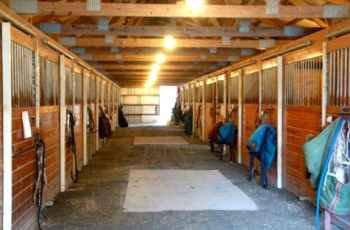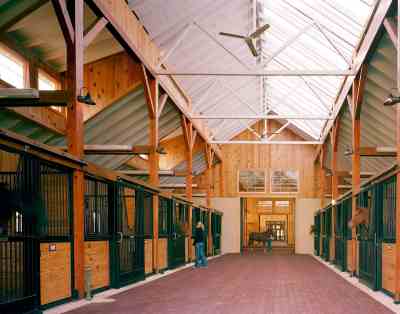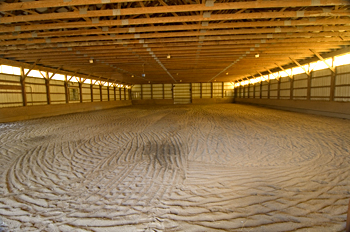|
By Jerry Tardif
If you have enough room on your property, proper zoning, the knowledge necessary to care for horses, and the time to do so, keeping your horse(s) on your own property can be very satisfying.
You can visit or "check up" on them whenever you want, and if very lucky, perhaps even ride whenever you're available without having to add in travel time both ways.
But most people aren't that fortunate because they don't have the time, space, knowledge, or proper zoning.
In those cases, people board their horses.

|
|
A Typical Clean, Well-Run Barn.
|
Selecting a barn to care for your horse is not an easy endeavor — many issues must be considered.
This article attempts to identify and help you with the most important of them.
Where to Start
You should start by identifying how you feel about horse care and what you want a barn to provide.
You might think you'd start with price, but the fact is that you're unlikely to keep your horse at a barn where your major requirements are not met no matter how cheap the board.
So, identifying your minimal requirements is a MUST first step.
Goals of Fellow Boarders
Probably the first item to consider is what kinds of activities other boarders at the barn pursue.
If you're into lots of lessons, training, and showing, you may not enjoy a barn that caters primarily to trail riders.
Fellow riders there may not be interested or care to even discuss showing.
Conversely, if you're a trail rider, you'll be frustrated if every time you ask other boarders to ride the trails with you, they respond with something about having to practice their cavalletti, piaffes, or flying lead changes in the arena.
There is no right or wrong interest, but you'll have much more fun at a barn with like-minded riders.
Owner Knowledge & Experience
Next, consider the barn owner's knowledge and experience.
Few of us would want to leave our horse in the care of an incompetent barn owner.
Yet, some of them exist and attempt to provide boarding services.
It's our job to determine whether or not we're comfortable with the judgment of that owner.
Would he/she be able to identify critical danger signs, such as the early warning signs of colic or tying-up?
Would the owner know what to do until the vet arrives or whether or not the vet is even needed?
Finding a competent barn is important for you to feel comfortable that your horse is safe while living there.
Owner Philosophy
Does the barn owner feel the same way you do about what is proper care, handling, and feeding of horses?
Some feel they should be pampered while others can be callous or even harsh in their treatment.
You need to make sure that your horse will be treated in a manner acceptable to you.
When you board at any barn, surprise visits are always a good idea, even if you've had your horse there for years.
That's because staff change, and sometimes, even the same owner may have a change in philosophy, will cut corners if money is tight, or just gets tired of the horse business.
You need to know what's going on at the barn when you and other boarders are normally not there, such as during the week.
If you're bolder, you can try asking more probing questions, such as whether or not the barn has bute on hand and how many horses are on it.
It's usually bad news to hear that many horses are in pain and regularly need medication unless it doubles as a rescue or recovery barn and such regular use is limited to those horses.
Condition of Property
What about the pastures and the farm property in general?
Is it relatively neat and well cared for?
Or are fences falling down or held together with bungee cords or baling twine?
Are there junks of old cars, trucks, farm equipment, or other machines hanging around?
Such junk is dangerous to horses because it's usually rusting and can also present sharp edges offering risk of gashes and infections to all around it.
Barn Condition
What is the overall condition of the barn?
Let's face it, things are going to occasionally break.
How long does it take for the owners to properly fix them?
Is the barn being well maintained or do you leave feeling the place is being held together with baling twine and bungee cords?
Are stall doors always breaking?
If so, is it because there's a wild horse or because each repair is nothing more than a quick "band-aid" fix?
You won't enjoy spending time or feel safe leaving your horse at a barn where too little time and money is allocated to regular maintenance and safety.
 Photo Courtesy of Blackburn Associates
Photo Courtesy of Blackburn Associates
|
|
A High-End Barn With More "Extras", But Also Costing More.
|
Barn Cleanliness
Because horses are animals, they're not as clean as the average human.
Their stall is their bedroom, dining room, and bathroom all in one.
That said, we all still have some idea of just how clean a stall should be.
Whether at your existing barn or a new one you're evaluating, do you feel the stalls are adequately clean?
And are they cleaned often enough for you?
Most barns clean their stalls at least once each day.
Some, will do a second, minor cleaning if the stall seems unusually soiled.
When do you feel a stall is too dirty and should be cleaned?
Whatever that is, you need to assess whether or not your current barn or a new barn you're considering meets your criteria.
Check by looking around closely inside several stalls.
Examine the shavings, sawdust, or whatever absorbent material the barn uses in its stalls.
Do they change most of it with each cleaning or is the job "short-shrifted"?
Are there mats in the stall?
Are they being kept adequately clean?
Look at the water pail.
Do they clean it every day?
Every other day?
Or do they just seem to refill it?
If the latter, what else is in that pail and are you comfortable leaving your horse with no other drinking options?
Barn Supplies
Take a look at the quantity of supplies, such as the packages or pile of shavings or sawdust used for bedding material.
Look also at the storage area for hay.
Take note as to how much bedding material and hay you feel is on site.
Ask to see where the grain is kept and assess how much is there.
Are there other kinds of grain with varying fat, protein, and fiber content to address different nutritional needs?
And overall, does it look as if there's enough or too little?
Evaluate the quality of the hay; after all, this is a large portion of what your horse will be eating here if you select this barn.
First, look at the hay; it should be free of foreign matter of any kind.
And small, flexible stems will appeal to your horse more than long, hard stems.
The color should look slightly green and not too yellow — it definitely should not be dark brown.
The smell should be appealing, fresh and sweet, not musty or moldy.
Slap a bale and you SHOULD NOT see any gray-white dust coming from it.
Moldy or dusty hay can make a horse sick.
If the hay fails these tests, the barn is buying substandard hay -- don't bring your horse here and risk disease.
Now ask yourself: does it look as if the barn has adequate supplies on hand or does it look more as if it's existing in a "hand-to-mouth" fashion?
If the barn has plenty of supplies, it implies that it has ample financial resources, is likely well-managed, and is run in an organized manner.
If not, it could mean the barn is in financial distress with inadequate funding and/or that it is an organizational mess.
Pastures and Turn-out
Ask about frequency of turn-out and how many horses will share a paddock or field.
Horses need enough room to occasionally run, and in a field, they need enough grazing pasture per horse if it will be a large part of their summer feed — 1.25 – 2 acres per horse or more is very good.
If less, their feed will have to be supplemented with hay.

|
|
A Barn With An Indoor Arena Is Particularly Nice In The Winter.
|
Space and "Extras"
How big is the horse farm property?
Does the barn have the amenities you want for your horse and riding?
This can take many forms from adequate paddocks, a round pen, a wash stall with running water (maybe even hot water), an indoor arena, adequate lighting in the barn and arena, nearby trails, etc.
Not every boarder needs all of these amenities.
Trail riders may not want to pay extra board for an indoor arena while those devoted to show may not care about nearby trails.
Ask yourself, do the barns you're considering have the amenities you want/need for the kind of riding you do.
How about bathroom facilities?
The barn may have none, a Port-a-let, or full bathrooms.
My barn has a bathroom with hot and cold water and even includes a washer and dryer for washing blankets, sheets, and coolers.
Many barns have a kitchen with refrigerator and perhaps a stove.
How important is it to you that a barn provide such facilities?
Does it matter to you if men and women share the same bathroom or is it important that they be gender specific?
Chances are that no barn will have all the amenities you crave; the more important questions is whether it has the ones you most care about at a price you can afford.
Training Services
Important to most boarders is the ability to purchase some extra services.
These services are in the area of knowledge and experience, but in addition to that related to horse care.
For example, is the owner, an employee, or an outside expert available to provide riding instruction?
How about horse training services?
Most boarders tend to think of a barn as providing these services and their availability often will positively influence the decision to board there.
Even if you're an experienced rider and can perform some of your own horse training, it's always great to have an even more experienced resource at your disposal when more advanced questions arise.
Distance From Home
Distance determines how much extra time you need to add to every planned ride, lesson, or visit to your horse.
While we all likely want to be as close as possible to our horses, driving further to keep your horse at a barn where you and he are happy is more important than having him close by.
You'll be willing to accept the longer drive if you're happy, but a closer barn where you're miserable or you feel your horse is not well cared for won't last long.
Cost
Similarly, cost is mainly a budget issue.
It isn't the most important item for most horse owners.
We all want to spend as little as possible on boarding costs.
Yet, we'll willingly pay more if we and our horse(s) are happy at the barn.
And we won't stay long at a cheap barn if we're not happy with the horse care, amenities, and other boarders — no matter how cheap!
But there's a limit.
If you notice that almost everything is "à la carte" and it sounds as if you're going to be "nickel and dimed", unless you're able and willing to pay for everything, a barn with such an ethic is likely to leave the horse of a lesser-payer in some state of distress — they won't give you or (your horse) anything extra whether your horse needs it or not.
If you're not affluent, it's not likely you will be happy with this barn and your horse's health could suffer — walk away and find another barn.
Summary
Now, take what you've observed and learned from the above exercise and determine the overall feeling you get from the barn.
Is this a place that seems financially sound?
Is your horse likely to live a good, well-cared-for life here?
Does the barn look as if it's going to protect your horse or fall down on top of him/her?
Does the barn have the facilities that are important to you and your style of riding?
Are you likely to enjoy the company of the other boarders or do you find many to be arrogant, boring, or dumb?
There is no "right" combination.
Every horse owner has his/her own goals and each barn has its own "personality".
But the key to finding a "happy barn" is to know what your goals are, to assess how a barn fits with them, and to finally find a happy medium amongst those goals, the distance, and the cost of boarding there.
Besides being an avid trail rider, Jerry Tardif is a technology consultant and a horse and nature photographer in SE Connecticut — see his work at: www.jerrytardif.com.
He is also co-founder and President of QueryHorse.
Back to Article Index
|